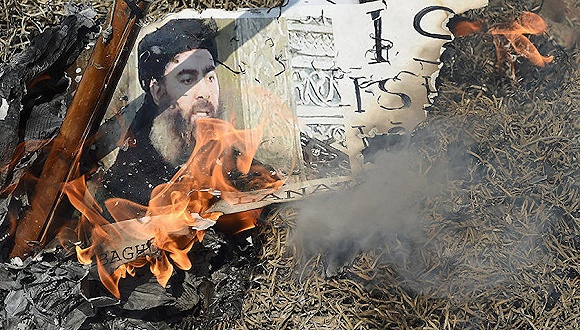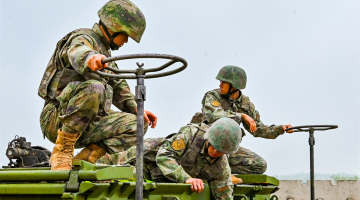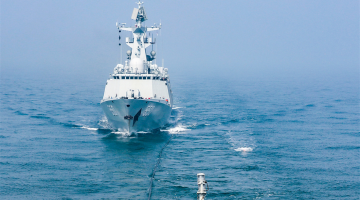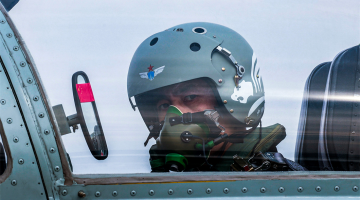
By Fu Bo
US president Donald Trump announced on October 27 that Abu Bakr al-Baghdadi, the leader of the extremist organization IS, was dead, which triggered extensive attention in the international community. However, the power of the post-Baghdadi ISIS cannot be underestimated and the international counter-terrorism campaign remains a long and hard journey.
The international community response varies
The international community responded differently to Baghdadi’s death.
Some US allies celebrated the news. British Prime Minister Boris Johnson posted on social media that Baghdadi’s death is an “important moment” in the combat against terrorism and that the UK will work together with the US and other allies to exterminate terrorist activities permanently. French president Emmanuel Macron described the death on social media as a heavy blow to ISIS and that France will continue to fight against terrorism with its allies until this extremist organization is uprooted completely. Turkish president Erdogan said Baghdadi’s death marks a “turning point” in the international collaboration against terrorism, and that “Turkey will continue to support anti-terror operations as always”.
Some countries doubted the effect of the operation. Russian Defense Ministry spokesperson Igor Konashenkov said the Russian military have no reliable information verifying ISIS top leader Baghdadi’s death during America’s military operation, and had reasonable doubts about the operation’s credibility. According to him, it was unlikely that Baghdadi had appeared in Idlib because that region has been controlled by Jabhat al-Nusra, a branch of al-Qaeda and a deadly enemy of ISIS. Iranian Communication & Information minister Jahromi tweeted that Baghdadi’s death was “no big deal”, saying Trump only killed something he had created. Even Pelosi, leader of the US House of Representatives, admitted that Baghdadi’s demise didn’t signify the end of ISIS despite its great significance, and large numbers of ISIS militants distributed in Syria and other places of the world are still attempting to expand their influence and carry out terrorist activities.
Several countries sounded the alarm of ISIS revenge. French interior minister Christophe Castaner asked French police to stay on high alert in a letter saying that the death of Baghdadi may trigger intense publicity of extremism and revenges. Deputy foreign minister of Kuwait Al-Jarallah also warned that Baghdadi’s death may cause revenges by terrorists and Kuwait will step up the coordination and consultation with the intelligence and security agencies of other Middle Eastern countries on anti-terror operations. An Iraqi political analyst pointed out that the possible revenges from Baghdadi’s followers will be a long-term challenge for Iraqi military.
Counter-terrorism campaign is a long and hard journey
Baghdadi has occupied large areas in Syria and Iraq and turned ISIS into a “well-known” terrorist organization by using both carrots and sticks since his takeover in 2010. Consequently he was called the “most dangerous man in the world”, and Washington has offered a USD 25 million bounty on his head. There are many signs that Baghdadi may have killed himself amid the US troops’ hunting operations. According to foreign media, Obeidi, ISIS’ “war minister” and a security official working for Iraq’s former president Saddam, has claimed to be the new leader. A “post-Baghdadi age” may have arrived both for ISIS and international terrorist forces.
In view of ISIS’ history and the development of international terrorist activities, the international anti-terror situation in the “post-Baghdadi age” is anything but optimistic.
On one hand, ISIS may stage a comeback. Its general strength may suffer in the next period of time as there will be power struggle inside the organization, and Americans also vowed in all sincerity that terrorist forces in the Middle East were dying after the death of ISIS founder Abu-Musab al-Zarqawi. However, Zarqawi’s successor Baghdadi quickly powered IS by changing their combat tactics, publicity approaches and ways of battles. It has some living space in Syria as well as new bases in countries like Libya, thus it’s possible that it will remain a strong terrorist force which cannot be neglected after its lying low temporarily.
On the other hand, the risk of a “confluence” of terrorist forces worldwide raises alarm. With the decline of ISIS in recent years, al-Qaeda, which once has been hostile toward it, has called for cooperation many times in order to reshape the international terrorism situation. The place where Baghdadi hide during his last moments is Idlib, “the largest shelter for al-Qaeda since September 11 attacks”, and this suggests the two organizations may have already colluded. If ISIS accelerates the confluence with al-Qaeda and other terrorist forces, terrorists in the Middle East will be more rampant and the global anti-terror situation will be more serious.









